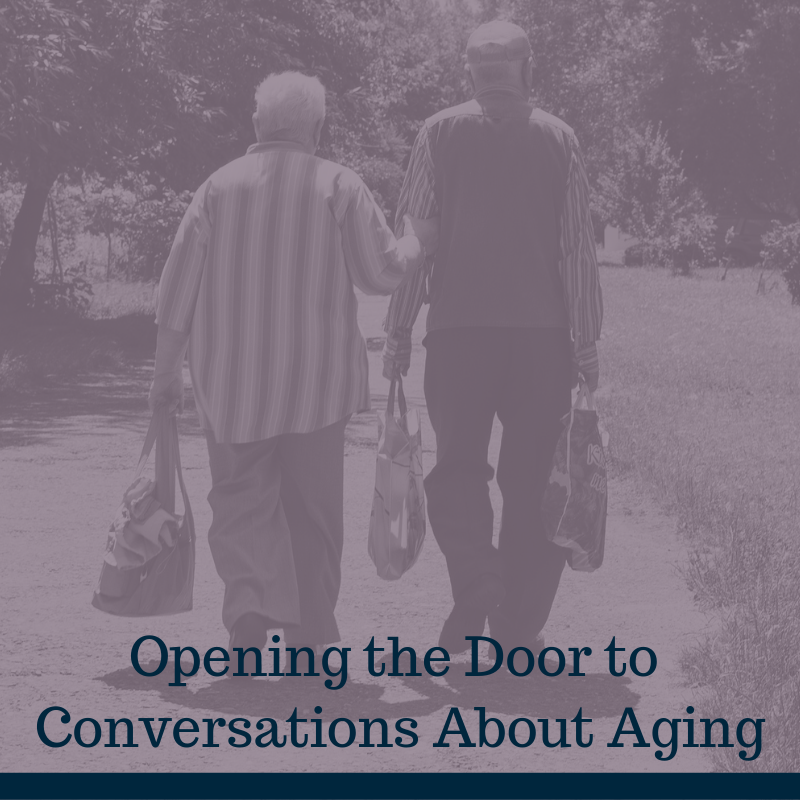By Brandi Graham, CTFA, CFP®
Everyone knows proactive is better than reactive. Then why is it most families don’t talk about aging until a sudden health crisis occurs?
Chances are you spent some time with your family members this holiday season. You may have noticed Aunt Mary’s house wasn’t as clean as it usually was, or Mom seemed to be answering for Dad more than normal. You might have noticed Uncle Bob seemed to be having a hard time with normal daily tasks. Talking to parents and family members about aging and lifestyle changes is difficult. It is better to have these conversations now while you still have time to plan. Open the door to communication. Keep it casual; you may need to have several conversations before your parents become comfortable with the topic. They may be afraid of losing control over their lives. It is important to focus your conversation on peace of mind, freedom, their ability to control their future and make their own choices. It is important to remember and respect that you are their child and always will be, so don’t try to be the parent.
How to get the conversation started
Plan ahead: Figure out what you want to communicate and organize your thoughts. Involve the family but do not overwhelm them with too many family members. Choose a quiet place without a lot of distractions.
You are not the parent: Keep an open mind; put yourself in their shoes; be respectful; let them know you care about what they want; listen.
You may decide to have one family member approach the topic first or you may decide to approach the topic with your siblings. Do not let your parents feel you are “ganging” up on them.
“Mom, we’ve noticed that you tire quicker these days. What can we do to help make it easier for you?”
Relate a story about a friend’s aging family member to begin the conversation. “Mom, please don’t think I am prying but I would feel much better if I knew that you have a plan if we need it. My friend’s aunt was in an accident and no one knew who to contact for medical decisions…”
Topics for discussion:
Legal documents and Estate planning: Sometimes it is easier to start the conversation with less personal topics such as, estate planning and legal documents.
- Is there a healthcare proxy with HIPAA language? Who is the proxy? What are their wishes if they are incapacitated and unable to make their own healthcare decisions?
- Is there a will or living trust and is it up to date? How can their current assets provide care in the event of a decline in health? Have they talked with their financial planner?
- Is there a durable power of attorney? Who is that person? Is that person familiar with the finances? Encourage your loved one to get the designated representative involved well before they are needed. Memory disorders are not always obvious until after the finances have fallen severely behind.
- Is there an advanced directive? (A document that describes the types and circumstances under which they would or would not want life-supporting services)
- Where are all these and other important documents stored? Who has access to this storage place? Are there documents that are stored electronically? Who has access to these?
Insurance: Medicare supplemental and prescription drug plan coverage can change significantly from year to year. When was the last time a plan comparison was done? Is there a long term care policy?
What do they want to happen if one or both of them begin to require help with daily activities? Do they want to stay in their current home as long as possible, downsize, or move to a senior living community?
- In-home care: is a family member willing and able to assist? How do your older family members feel about this? Would they prefer to hire outside the family? Will the home require adjustments to make it safer and more convenient? Falling is a leading cause of incapacity and many older people are reluctant to admit to falling.
- Is living with a child an option? Would your parents be comfortable with you or a sibling caring for them?
- Assisted living facility: how do they feel about this? Do they have any thoughts on locations? Offer to visit some locations to see what would suit their needs.
Be active – encourage your loved one to stay active both physically and socially. This will promote good emotional, intellectual and physical health.
Scams: Older people are targets of numerous scams and often ashamed to admit they have been scammed. Talk with them about the types of scams to watch out for and encourage them to be hesitant when answering unknown callers.
The goal is to provide peace of mind to family members and for your parents to continue to live life to its fullest with dignity. Don’t be afraid to open the door.
If you have any questions on how to handle a situation like this, feel free to contact Brandi B. Graham ([email protected]) Senior Advisor with John G. Ullman & Associates, Inc.


